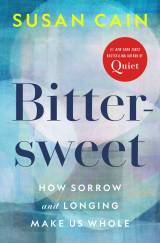[ad_1]
Cain: The phrases “move on” or “get over it” are basically saying, “It’s not okay for you to carry your loss for very long. Sure, it’s okay to be sad on the day of the loss. And maybe it’s okay the day after that. But there’s a point at which we are going to expect you to get over it. It should no longer be part of you. Go back to your pre-loss self.”
 But there’s another path: you can move forward with your life and carry that loss with you. You can still feel sad sometimes while also integrating new experiences and having new joys. It all becomes part of you. So instead of saying, “Okay, I’ve got to get from sad back to happy as fast as I can,” you realize life is just a collection of experiences that shape you and you’re carrying them all.
But there’s another path: you can move forward with your life and carry that loss with you. You can still feel sad sometimes while also integrating new experiences and having new joys. It all becomes part of you. So instead of saying, “Okay, I’ve got to get from sad back to happy as fast as I can,” you realize life is just a collection of experiences that shape you and you’re carrying them all.
Kris: While reading your book, I wrote in the margins this phrase from Dr. Susan David: “Life’s beauty is inseparable from its fragility.” As adults, we sometimes struggle with how to talk to kids about the fragile side of life – and put a premium on shielding them from pain and discomfort. What are some of your thoughts about this?
Cain: I think we inadvertently teach kids, especially those growing up in relative comfort, that “normal” means everything is sky high and flourishing. But the smooth road is not the default; it’s the detour. Unexpected twists and turns are actually the main road. When life seems to go off path, kids need to know that it doesn’t mean something is wrong with them or with their experiences. It’s incredibly comforting for children to know that life is made up of bittersweet. The question then becomes, how do you navigate it? Challenges can become an opportunity for them to learn – while still under the loving guidance of their parents – that this is part of what life is.
When my kids were little, we rented a house in the countryside that was right next to a field where two donkeys lived – Lucky and Norman. The kids and the donkeys absolutely fell in love with each other. They spent their whole week feeding the donkeys apples and carrots. And then as always happens with any summer romance, it had to come to an end. The kids were crying themselves to sleep at the thought of having to say goodbye to Lucky and Norman. We said all kinds of things to help them feel better. But what gave them the most comfort was when we said, “These kinds of goodbyes are a natural part of life. It’s not the first time you’re saying them, and it’s not going to be the last time. Everybody has to say these kinds of goodbyes. It’s natural.” It helped them to hear that the feelings they were having were normal.
Kris: Just last night, my eight-year-old son called me into his room in tears at 10 pm and said, “I don’t want to fall asleep because once I do, vacation’s over.” It strikes me that these small transitions can be a fertile time for parents and teachers to help kids think about the beauty in the bittersweet.
Cain: Absolutely. Because transitions are mini goodbyes, right? They’re an expression of the final goodbye that we all face eventually. We don’t know that when we’re getting upset about the transition, but that’s really what’s happening. And so every time you can walk your child through the discomfort of transitions and the pain of the mini goodbye – whether it’s the last day of camp or the last day of vacation – those are prime learning moments.
I quote a poem in the book by Gerard Manley Hopkin called “Spring and Fall.” And it’s written by the poet to a little girl who is crying because the leaves are falling and she doesn’t want the leaves to go away. She doesn’t want winter to come. And he says, “Márgarét, áre you gríeving/Over Goldengrove unleaving?” And then later he says, “It’s the blight that man was born for/It is Margaret you mourn for.”
I can’t say those lines without shivers because of the wisdom and the empathy of that insight: Margaret doesn’t know it yet; she’s crying over the fact that life is impermanent.
But here’s the thing that’s also true about that impermanence: it can be so painful, but it’s also so intensely beautiful. The beauty of impermanence might be the greatest beauty we have – and all humans experience it. There’s something about knowing that we’re all in this crazy, beautiful, intensely imperfect experience together that is very uplifting.
Kris: Let’s talk about the idea of “effortless perfection.”
Cain: I sat down with a group of students at Princeton and asked them, “What is your life like, really?” Literally two minutes into the conversation, they start talking to me about this phenomenon they call effortless perfection, which is this intense pressure that they all feel to be effortlessly perfect – to be very fit, very good looking, to have great grades, to be socially adept, all this stuff. And not only to achieve all those things, but to look as if you didn’t have to try and it all came to you naturally.
[ad_2]
Source link

